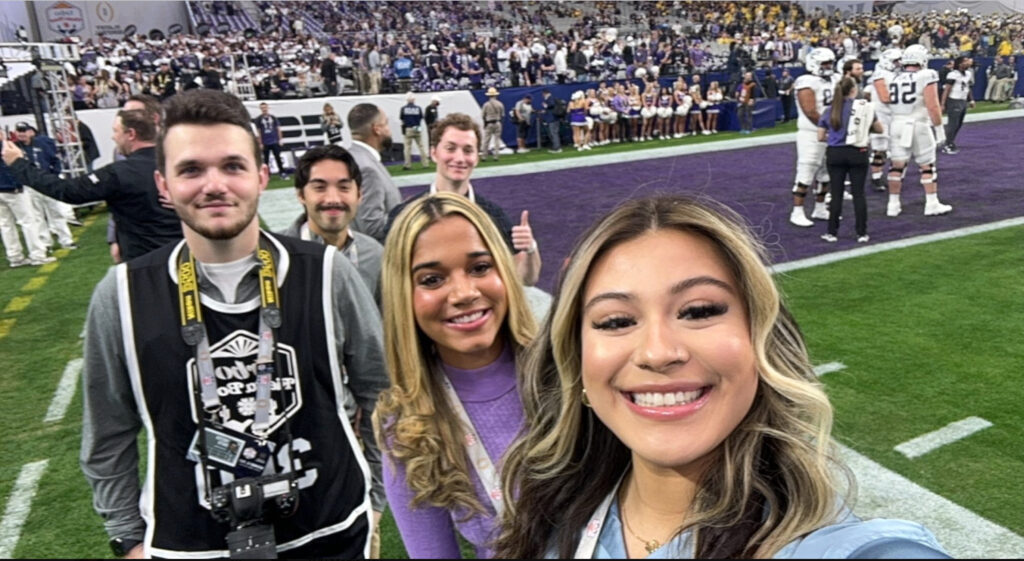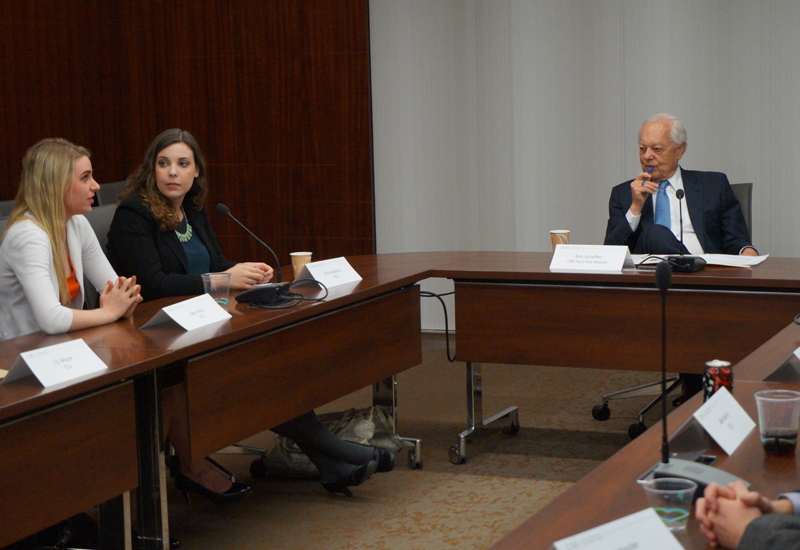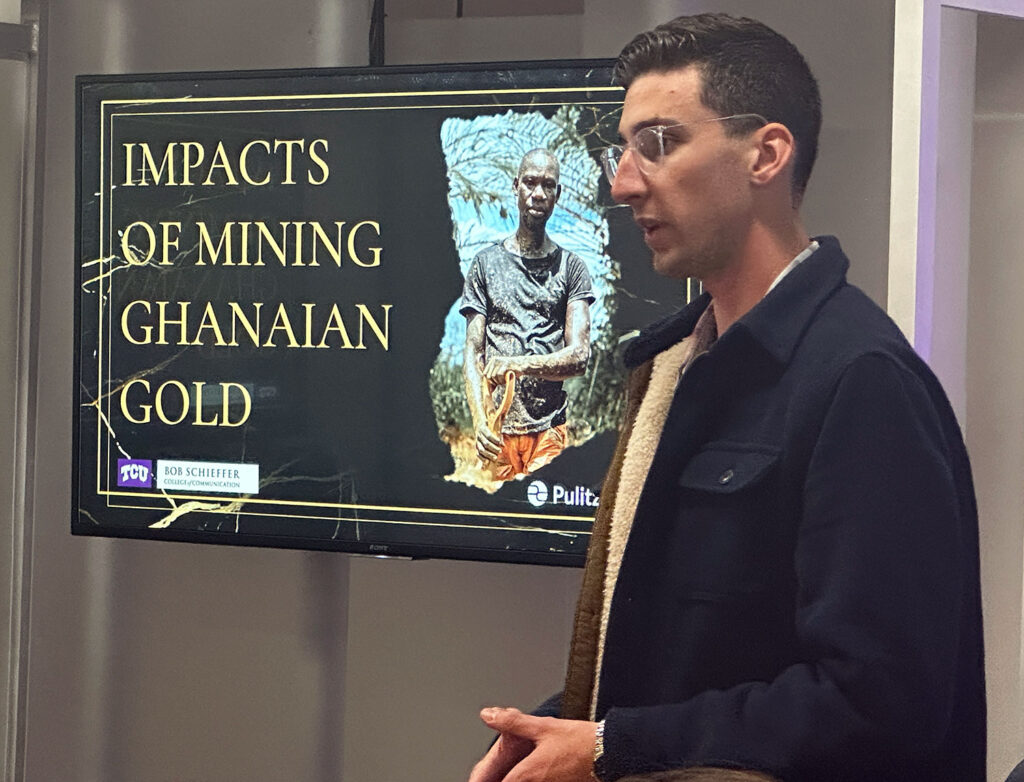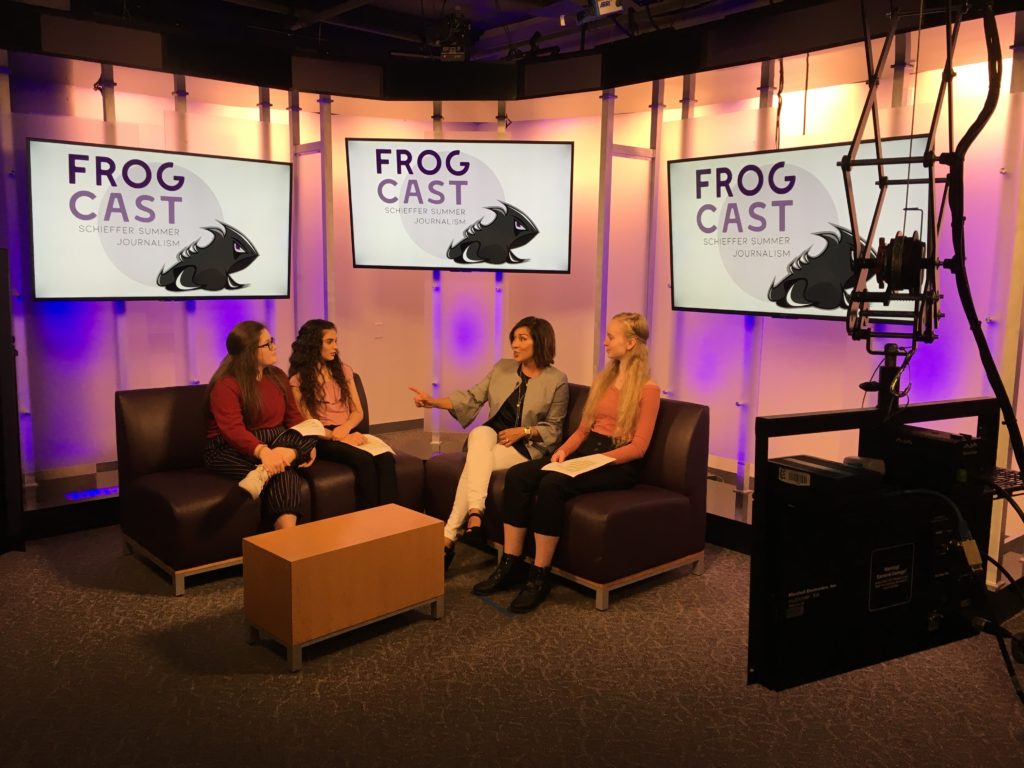The Department of Journalism has various programs for students to get involved and gain experience. Through these programs students have the opportunity to gain quality experience in the field of journalism and jumpstart their career as a journalist.
STUDENT MEDIA

Covering the College Football Playoff are (from front right) Lys Marquez, Dru Kennedy Hawkins ’23, Tristen Smith ’23, Micah Pearce and Charles Baggarly ’23.
TCU 360 is the digital-first nerve center of TCU Student Media, available online via computer, smartphone and tablet. All students involved with campus news coverage are part of the TCU 360 staff.
Student leaders decide what stories to cover and publish, with the assistance and advice of faculty mentors.
Our students also produce:
- The Skiff, our award-winning weekly newspaper, the longest printed paper in Tarrant County, since 1902.
- TCU News Now, the campus broadcast news operations that produce newscasts from our state-of-the-art digital newsroom.
- The Leap and Unscripted, weekly broadcast shows covering pop culture and sports.
- Image, our national award-winning, long-form journalism magazine that covers the TCU community.
- PolitiFrog, which focuses on politics from a Gen Z perspective in innovative digital ways.
Bob Schieffer College of Communication in Washington

Bob Schieffer moderates a class exercise at The Washington Center.
In the Department of Journalism’s Washington, D.C. internship program, a select group of junior and senior students spends the fall semester in the nation’s capital.
By taking courses in the fall catalog of The Washington Center, students can earn additional hours toward their TCU degrees. Students live in the residential facilities of The Washington Center near Union Station unless other arrangements are made and approved by the Department of Journalism.
There is no difference in tuition for this program than what would typically be incurred on campus; however, housing expenses and the cost of living are higher in Washington.
Pulitzer Center on Crisis Reporting Partnership

JD Pells ’22 discusses his Pultizer Center project about gold mining in Ghana during a campus visit in spring 2023.
Journalism students have the opportunity to apply for a reporting fellowship through the Pulitzer Center in Washington D.C. The program is part of the Pulitzer Center Campus Consortium, which aims to engage with critical global issues.
Journalism majors or minors of any year may apply each fall for the following year. The fellow will be announced during the annual Pulitzer Center Symposium at TCU in March.
The chosen fellow will produce an independent reporting project from almost anywhere in the world that addresses some of the most underreported stories of our time. A stipend will be awarded to help offset travel costs.
Fellows also get mentorship, networking opportunities and journalism resources through the Pulitzer Center. They attend a fellows weekend in Washington, D.C., hosted by the Pulitzer Center, to learn about the work of other fellows, network with professional journalists and more.
Schieffer Summer Journalism Camp

Schieffer College alumna and NBCDFW news anchor Deborah Ferguson visits with students.
During the Schieffer Summer Journalism Camp at TCU, young aspiring journalists learn to create news stories across multiple media platforms. The two-week intensive program is open to high school students as well as incoming first-year students who have been admitted into TCU and to the journalism major.
This immersive experience gives students a taste of the college experience. It offers high school students the opportunity to produce content for the Web, broadcast and print. Students develop their critical thinking and writing skills while generating story ideas, which they then report and develop into news stories. They will produce content for a newscast and write for a website.
TCU faculty introduce students to the fundamentals of digital reporting in a two-week residency program. Media professionals from Fort Worth and Dallas volunteer their time to share their expertise and experiences with students.
Journalism students are encouraged to work as counselors during the camp. Counselors live in the residence hall with the campers, help on their projects and share their own TCU and journalism experiences.
